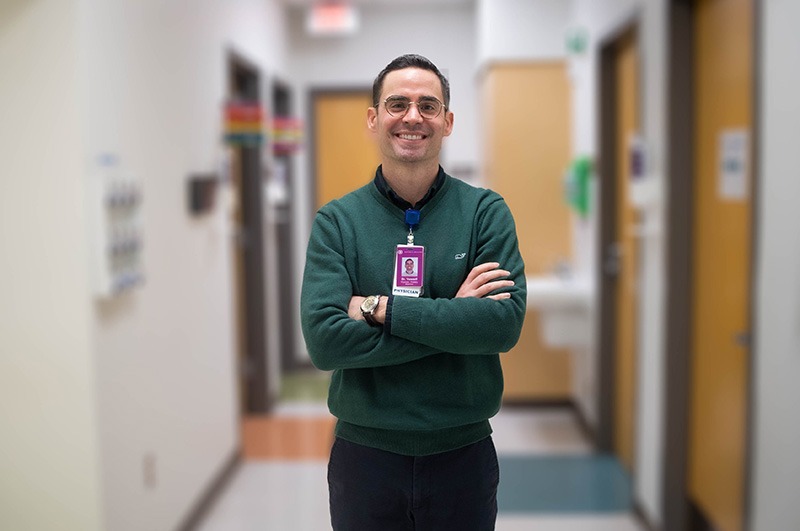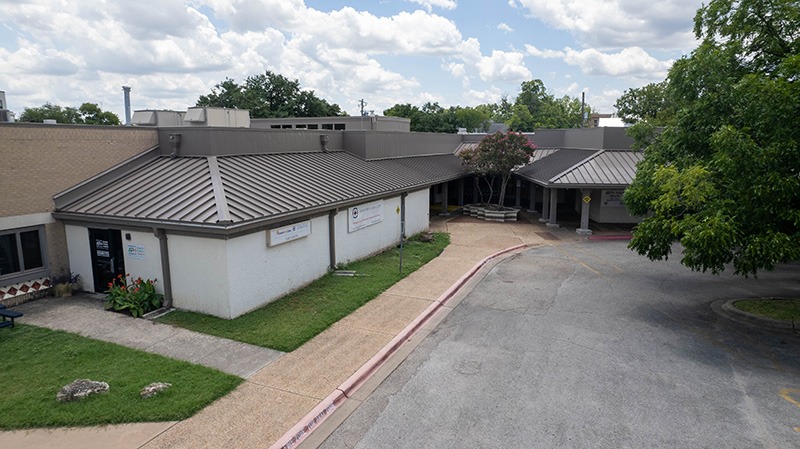April 2, 2025
When an inmate at the Travis County Jail arrived at the Central Health East Austin Specialty Clinic in June and was treated as part of the safety-net system’s Justice Involved Health (JIH) program, he complained of extreme pain in his right foot and burning in his toes.
Dr. Brett Vessell certainly knew what those symptoms meant.
Diabetic neuropathy. Nerve damage.
Not good.
The Central Health podiatrist, in his sixth-year practicing, had treated a sizable percentage of his patients with similar issues—diabetic conditions with signs of neuropathy. So, he approached the 61-year-old patient and placed his hands on his feet.
Ice cold.
“His pain was unrelenting and severe, and his foot was discolored,” Dr. Vessell said. “These things, they tell me the tissue isn’t happy.”

Dr. Vessell had a clear understanding of his patient’s core problems. But to be sure of more underlying concerns, he issued an X-ray and a Doppler—a hand-held ultrasound device—to further pin down the details. Was there a broken bone? Were the blood vessels calcified?
“We get X-rays to further help our diagnostic capability,” he said.
The information confirmed to Dr. Vessell that his patient had acute limb ischemia, a serious condition which meant the foot had no blood flow and that, if left untreated, could lead to amputation. Dr. Vessell instructed the Travis County Jail officers that his patient needed immediate care in an Emergency Room.
“That is an emergent thing,” Dr. Vessell said, “because time is perfusion, time is blood flow, and time is the leg.”
The guidance saved the patient’s foot.
“Doing your small part,” Dr. Vessell said. “You do not always get those dramatic results. But sometimes the crumbs make the crust. Being able to see him and save a foot, it makes you get out of bed the next day and go to work.”
That patient was the very first example of Central Health’s JIH program, which officially launched in June of 2024. JIH provides specialty medical services to Travis County inmates, with the overall aim to provide better health outcomes for the jailed population.
Central Health’s build-out of its program began first with podiatry, which treats conditions impacting the feet and ankles, then followed with services including Supportive and Palliative Care (Aug. 5, 2024), Infectious Disease (Oct. 14, 2024), Cardiology (Oct. 24, 2024) and Nephrology (Feb. 10, 2025).
In coordination with the Travis County Sheriff’s Office, which brings patients in and provides officers to stand-in during appointments, the service has had an immediate impact. The main result has been health at the 360-degree level, from a 63-year-old male who received treatment through Supportive and Palliative care for cancer—before and after his release—to a 49-year-old male who was given Cardiology support after a heart monitor test found him at risk for stroke.
“I think the [JIH program] is a great example of how we don’t just rehabilitate patients due to past choices, but ideally improve their life, too,” Dr. Vessell said.
Patient navigation is a critical aspect of the program, too, because how inmates reach the clinics requires precise coordination. Ultimately, Central Health works closely with the medical team at the Travis County Jail, which provides primary care and basic services before a referral is taken to JIH if there are more serious underlying concerns.
Central Health’s care coordination team works on developing wrap-around medical care, with options including its Medical Access Program (MAP), a health coverage program for Travis County residents with low-income and no access to basic health care needs.
JIH was developed by Central Health, Travis County’s hospital district, to bridge gaps in care to the most vulnerable populations. The program has so far provided treatment to a range of inmates and has plans to extend its service lines in the future.
